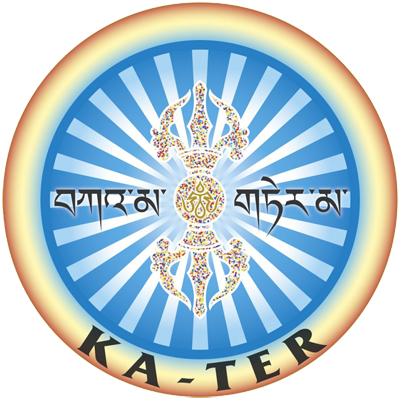Founded by Chögyal Namkhai Norbu in 2002, the Ka-Ter Translation Project of the Shang Shung Institute Austria celebrates its Twentieth Anniversary this year.
The name Ka-Ter derives from the terms Kama and Terma: Ka stands for Kama, all the words of the Buddha and includes the original scriptures of Mahayoga, Anuyoga, and Atiyoga translated from the Sanskrit and Oddiyana languages; Ter stands for Terma, literally “treasures,” hidden and rediscovered teachings transmitted in short or direct lineages by tertons, masters who have that visionary capacity. Termas manifest in incredible and various ways, about which it is said, “…Revealing the essence of supreme realization, these teachings emerge from the midst of the sky, from walls and trees, and from numberless places to those whose aspiration is perfect.“
Throughout the history of the spirit, many seekers in countless searches have looked for authentic and profound teachings that could lead them into the essence of their being. Some, like us, were fortunate enough to encounter a great and generous master prepared to share his knowledge, but only when the teacher and the student speak the same language or in the presence of qualified translation could this essential process take place.
The sacred Tibetan texts, so precious and unique, must be translated correctly, precisely, without changing essential meanings, and if possible composed by an artful translator with an equal command of the languages employed, thus enabling the transmission of the highest degree possible of understanding of the original teaching, given the limited absorption of its truth and power attainable from the printed page. This requires of the translator a profound dedication of skill, energy, devotion, diligence, humility, and long years of study and training and to accept this responsibility in order to become a qualified translator and/or an able instructor of potential translators is really extremely difficult.
Our Master pointed out that to become familiar with the unique knowledge of the ancient masters of Tibet, you must comprehend their scriptures and precious texts and make the age-old wisdom, knowledge, and experience of Tibetan culture available for future generations in Western and Asian languages in precise and correct translation. To realize this goal, the possibility must be offered to study and learn Tibetan for beginners as well as to deepen the extant familiarity with that language of the more knowledgeable students, in both cases to enable the development of high capacity translators.
Reflecting that priority, already in the late 1970s, several Tibetan translation projects had been launched in our Community and numbers of texts completed, mostly by Adriano Clemente and also by Jim Valby who devoted many years to the translation of Dzogchen Tantras. In addition, outside the ken of translations from the Tibetan, the first transcriptions of Rinpoche’s teaching-retreats in booklet form began to appear, published by Shang Shung Edizioni, now known as Shang Shung Publications, in Italian and English.
However, the translation of Dzogchen texts from Tibetan, a main task of the translators and the publishing house, faced notable challenges during the early years after the founding of the Dzogchen Community because of the large number of original texts to be translated, the few qualified translators available within the Community, and the limited, irregular sources of funding available to compensate the full-time commitment of the translators. In 1989 Chögyal Namkhai Norbu founded the Shang Shung Institute in Italy, charging it among other responsibilities with the task of establishing a functional base for all translating activity and for the training of new translators, proposals which for a while longer remained unrealized due to difficult circumstances.
Then, laying a stable foundation for the fulfillment of these urgent needs, Chögyal Namkhai Norbu in 2002 created the Ka-Ter Translation Project. As Rinpoche said,
“If you want an understanding of Dzogchen, you need the original books. That is essential… The Ka-Ter Translation Project is an important step in that direction.”
The central management of this new endeavor he entrusted to the Shang Shung Institute Austria, giving Director Oliver Leick its financial and administrative responsibilities and designating Tibetologists Adriano Clemente, Elio Guarisco, and Jim Valby as the main translators from Tibetan, with the appointment of Elio also as instructor of a yearly training course for translators. Already in summer 2003 Elio conducted the first Training for Translators from Tibetan, held in Merigar West. Later, Professor Fabian Sanders, appointed in 2010 as the fourth crucial member of that scholarly team, assumed the primary responsibility for courses in the Tibetan language in what remains a yearly event under his guidance.
The fundamental resolution of the dilemma of finding sufficient funds to provide adequate living for the translators from the Tibetan was sought in a donation system developed to support all our activities of translation and publication. Since the very beginning, the Ka-Ter Translation Project has been made possible by the unstinting donations of members of the Community.
In one such example, fulfilling the wish of Chögyal Namkhai Norbu, the Shang Shung Institute Austria and its related Ka-Ter Project, thanks to the generosity of the Community, was able to underwrite the digitalization of all the teachings revealed by Changchub Dorje. Some 260,000 pages of Tibetan text were digitalized, verified, and catalogued, the bulk of the work occurring in Tibet at Changchub Dorje’s residence in Galingteng, Tibet and in the Shang Shung Institute at Merigar in Italy.
Elio Guarisco summarized as follows the mode of financing adopted by the Ka-Ter Translation Project:
“All this has been made possible through the constant, untiring, conscientious, and dedicated fund-raising of Oliver Leick and the Shang Shung Institute Austria in many years of devoted service to the Master and the Dzogchen Community.”
